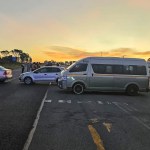TAINTED TAP WATER
City of Tshwane awaits tests from NICD after outbreak of diarrhoeal disease in Hammanskraal

The National Institute for Communicable Diseases (NICD) is said to be investigating the source of the ‘diarrhoeal disease’ outbreak in the City of Tshwane’s Region 2, which includes Hammanskraal. Residents are being urged not to drink water from their taps as the outbreak has left 10 dead and 67 in hospital. This is the second time in five years that the region has been hit with a diarrhoeal disease – allegedly linked to unsafe water.
The Gauteng Department of Health has confirmed at least 10 people have died after an outbreak of diarrhoeal disease in Hammanskraal, northern Pretoria. More than 60 people are also being treated at Jubilee District Hospital in Hammanskraal. The department says it has mobilised additional resources, including medical and nursing staff, from surrounding hospitals and local clinics to help provide medical care at the hospital.
Motalatale Modiba, head of communication at Gauteng’s health department, confirmed:
“Since Monday, 15 May 2023, to date 95 people from Kanana, Suurman, Majaneng, Greenfield, Carousel View, Lephengville and Sekampaneng have been seen at the hospital with similar symptoms. Currently, there are 37 people admitted to the hospital with cholera symptoms, and unfortunately, 10 people have demised. The 10 people [who] died include a three-year-old and 9 adults.”
In response to the outbreak, the health department and the City of Tshwane have sent experts to the hospital and community of Hammanskraal to investigate the cause of the outbreak.
On Sunday, Gauteng Health MEC Nomantu Nkomo-Ralehoko, together with City of Tshwane MMC for Health Rina Marx and Hammanskraal community leaders, visited Jubilee District Hospital. The City advised residents of Hammanskraal and surrounding areas to avoid drinking tap water until the NICD has finished testing the water.
“The City would like to encourage residents in the affected areas to regularly wash the containers they use to draw water from the water tankers with Jik detergent, and to boil water drawn from other sources before drinking it. Communities are also urged not to conduct religious activities, such as baptism in the rivers or streams,” the City said.
It is not the first time the area has been affected by a possible cholera outbreak, an acute diarrhoeal infection caused by ingesting food or water contaminated with the bacterium.
In June 2018, the City of Tshwane sent a team of experts to conduct urgent tests in the greater Hammanskraal area after a suspected cholera outbreak in Dilopye‚ New Eersterus‚ Temba‚ Babelegi Industrial‚ Marokolong‚ Ramotse‚ Majaneng‚ Mandela Village‚ Sekampaneng and Hammanskraal.
@CityTshwane has been alerted by residents in the Hammanskraal
area of a possible cholera outbreak. #HammanskraalWater— City of Tshwane (@CityTshwane) June 27, 2018
At that time, the NICD and the Department of Health could not find evidence of an outbreak, but investigations continued, as reported in News24. In August 2019 advocacy group, the Organisation Undoing Tax Abuse (Outa) said it found samples of E. coli bacteria in the Hammanskraal drinking water, which the City of Tshwane disputed.
Meanwhile, that same year the South African Human Rights Commission (SAHRC) deemed the water in Hammanskraal “unfit for human consumption”. As a result, the City of Tshwane says it sends 52 water tankers to provide drinkable water to informal settlements three times a week, and 40 water trucks to formal areas daily in Region 2.
Hammanskraal has faced a water crisis and residents have lived with unsafe water since 2005 – which has been blamed on the Rooiwal Wastewater Treatment Works, the Temba Water Treatment Works and the Apies River for providing contaminated water.
Read more in Daily Maverick: Water is life: commission of inquiry’s report reveals ‘damning’ review of water crisis inertia in Hammanskraal
Hammanskraal water is ‘contaminated by sewage’
According to Outa Hammanskraal, water is dirty because it is contaminated with sewage:
“At Hammanskraal, the Rooiwal Wastewater Treatment Works has not been maintained or has broken down and is spilling raw sewage into the Apies River, which feeds into Leeuwkraal Dam, the main water supply to Hammanskraal. The Temba Water Treatment Works, which extracts water from Leeuwkraal Dam, provides water to Hammanskraal. Temba does not work effectively, either due to a lack of maintenance and other problems.
“The contamination of the Apies from Rooiwal has caused the potable water provided to the Hammanskraal community to be contaminated by E. coli and other harmful matter.”
Following the resurfacing of the outbreak in Hammanskraal, many have taken to social media to express their frustration:
“I have had stomach cramps for almost 2 weeks … vomiting, lost my appetite and lost some energy. I was even dehydrated from the 29 April I had no idea it was the water thank God I’m still alive,” said Mmasello Matilda.
According to Grammar Zwane, a resident of Hammanskraal, the water in Hammanskraal “smells like faeces”.
“SA government advises Hammanskraal residents to wash their hands, rinse food and bathe. Forgetting that we are supplied with dirty water through our taps,” writes Karabo Theo in a Facebook post.
Another said: “People of Hammanskraal have been crying for clean water for years now, I wish you’re held accountable for those who passed on because of the dirty water, you such a shitty municipality wena.”
Yet another said: “People of Hammanskraal have been without healthy drinking water for years. What is your plan to ensure they have healthy drinking water soon? For all we know, people in Hammanskraal have been dying silently due to this poisonous water. Please do something, we have families in Hammanskraal.” DM

















 Become an Insider
Become an Insider
Comments - Please login in order to comment.